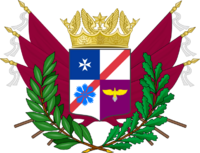Diarchist Party: Difference between revisions
mNo edit summary |
mNo edit summary |
||
| (One intermediate revision by the same user not shown) | |||
| Line 1: | Line 1: | ||
{{Infobox political party | {{Infobox political party | ||
|country = Amalfi | |country = Amalfi | ||
| | |name = Diarchist Party | ||
| | |native_name = La Partitia Principala | ||
| | |logo = Diarchist Party Amalfi.png | ||
|leader = [[Ravius Semnus Darcae]] | |leader = [[Ravius Semnus Darcae]] | ||
|colorcode = #901EA3 | |colorcode = #901EA3 | ||
Latest revision as of 15:35, 7 February 2020
Diarchist Party La Partitia Principala | |
|---|---|
 | |
| Leader | Ravius Semnus Darcae |
| Founded | 4 July 1940 |
| Ideology | Diarchism |
| Colours | Purple and Green |
| Senate | 27 / 450
|
The Diarchist Party (Amalfitan: La Partitia Principala, PP), is a diarchist party in Amalfi. Founded in 1940 in response to the Socialist Party's campaign to abolish the diarchy, it briefly became one of the most successful parties in the modern history of the Senate of Amalfi, achieving an absolute majority with 263 senators in the 1944 general election and 228 in the 1949 general election. As of the 2015 general election, it forms part of a coalition government with the Libertarian Party and Society for Liberty.
The party, which was founded to protect the position of the diarchy, never formulated policies on matters beyond government reform. Political commentators and even high-ranking party members have criticised the party for failing to modernise its programme to relate to contemporary issues in Amalfi and its area. Of particular concern for its membership was party leaders' refusal to take a stance in regard to the contentious topics of federalisation and colonial equality. In the run-up to the 2015 general election, its leadership announced a broad new party manifesto addressing colonial rights and social policy, clearly aligning it with the ever-growing libertarian movement in the Senate. It currently holds 27 seats in the national government and has not been the source of a princeps since 1990.
